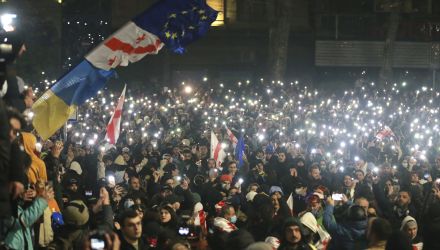DAMASCUS -- I have been traveling to Syria regularly for 40 years, and every time I visit Damascus I make time to go to the old city and the spectacular early 8th Century AD Umayyad Mosque. The timeless beauty and power of the place are always dazzling, no matter how many times you experience it.
Equally constant are the nature and direction of modern political rule in Syria, which has been under Baath Party guardianship since the early 1960s. Whether you like it or dislike it, Syrian policy under President Bashar Assad -- as under his late father Hafez Assad -- has been very consistent, changing only in response to intense internal or external pressures (such as its departure from Lebanon in 2005, or its gradual economic reforms in the past decade).
Today, we may be witnessing signs of a new strand of change in a society that does not change very often, this time in the civil society sector. At a conference here in Damascus I attended last weekend, organized by the Syria Trust for Development, Syria witnessed several simultaneous phenomena. It held an international conference on "the emerging role of civil society in development" that was based on an open call for papers, with participation by dozens of scholars from around the world. The few Syrians who presented papers were more analytical than propagandistic. Two keynote speakers were from the United States and the United Kingdom - hardly the sort of thing one expects from a country that defines itself as the throbbing heart of Arabism.
First Lady Asma Assad opened the conference by declaring that the state wanted to open more space for civil society to work, develop and partner with the government in designing and implementing development-oriented policies. We will learn from our mistakes, she said, and a law will be passed soon -- after consultations with civil society -- to provide non-governmental organizations the safeguards they need to operate effectively. She challenged them, for their part, to rise to the occasion and achieve higher levels of efficacy and professionalism. Her overall theme of partnership reflected a realization that the government alone could not provide all the expertise or services needed to develop the country at the pace that its citizens expect.
The same message was delivered more explicitly by the Deputy Prime Minister for Economic Affairs, Dr. Abdullah Dardari, who noted the weaknesses or limits of both the state and the market economy in achieving national developmental goals. Civil society and citizen participation through non-governmental organizations are critical for moving on Syria's goals, which he said included major civil service reform, providing social protection for all, increasing job creation by small and medium enterprises, reforming education, and addressing the challenges of environmental stress and climate change. The new spaces being opened for civil society, he said, will allow it and the state to interact and work together.
In the closing session panel, many Syrians in the audience representing the still stunted civil society sector openly and repeatedly challenged Dardari on several of his points or promises, to which he responded by promising deep consultations, and declaring that this initiative is just starting, and has a long way to go.
All this is unusual for a Syrian society that has been ruled by a very centralized and strict Baathist government that dominated all aspects of citizens' lives. This is not a state that routinely admits its shortcomings, asks for help from partners, or subjects its senior officials to public questioning. So what is going on in Syria? How serious and sincere are these expressions of change, partnership and greater operating space and responsibility for civil society?
Only time will tell, but for now we hear the state proclaiming a desire to change, while skepticism abounds about whether its rhetoric will translate into action. This is mainly because previous Syrian government pledges of change did not always happen, or newly opened spaces were quickly closed (as in human rights and political discussions, or a seriously free media). Yet the tone and consistency of this week's high level message of change in the civil society sector are both novel and consistent, and therefore intriguing, and worth exploring and monitoring.
The best hope now is that Syrians themselves will test the sincerity of their government's call for a deeper, stronger civil society. If the state is sincere, this is a moment of some hope for Syria and its neighbors. If it is bluffing, this is the moment to call its bluff and find out.
Protected timeless treasures are great for tourism and a sense of historical identity; a prosperous modern state, on the other hand, needs dynamism, pluralism, citizen participation, a free flow of ideas, and the protective framework of the rule of law. We shall soon find out if Syria can master both sides of the national equation, as its new rhetoric suggests it seeks to do.
Khouri, Rami. “Signals of Change from Syria.” Agence Global, January 27, 2010





